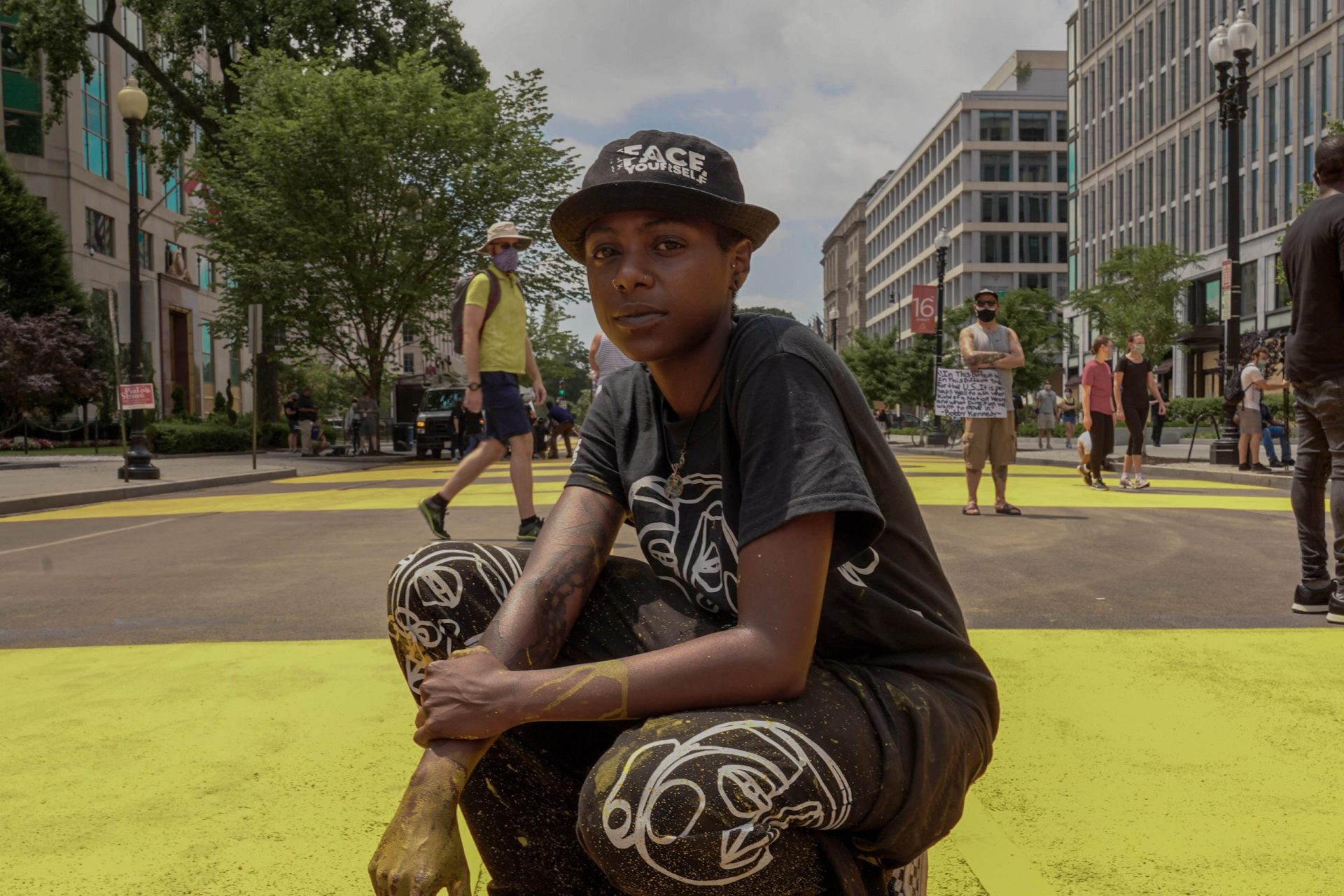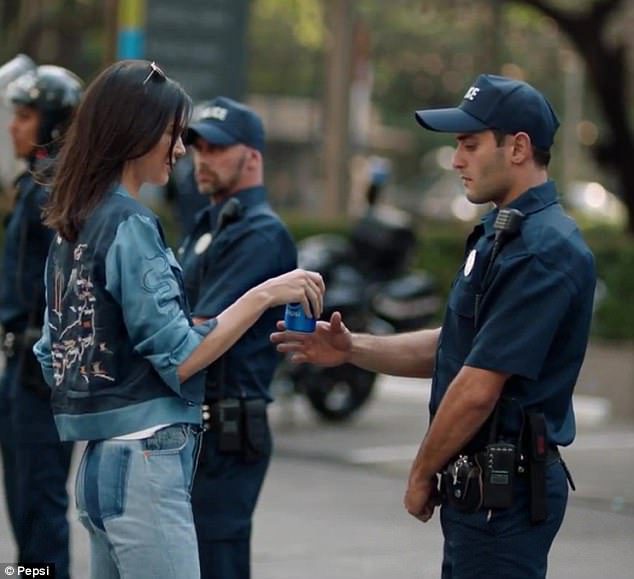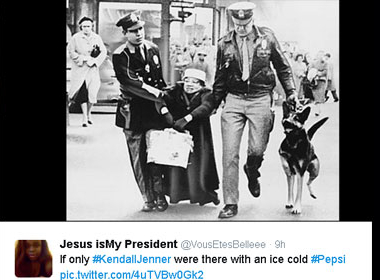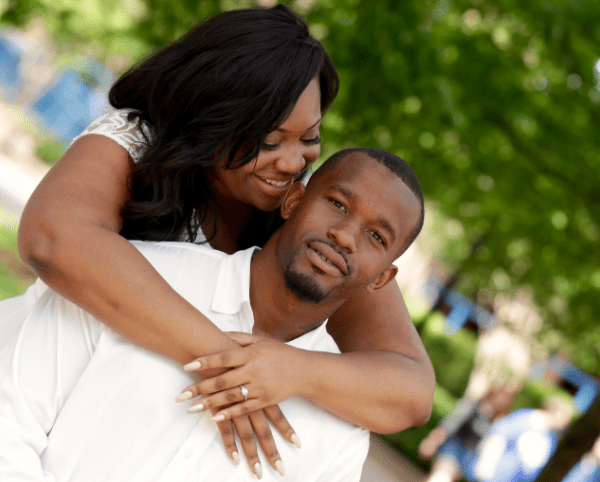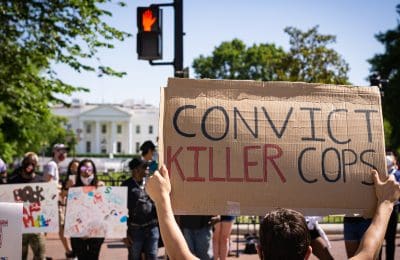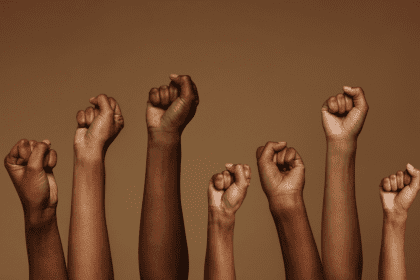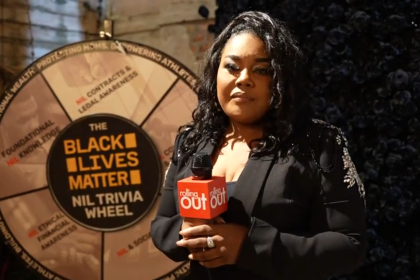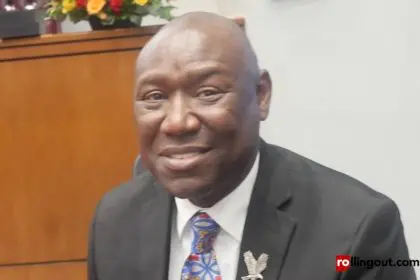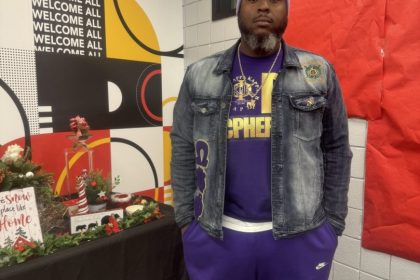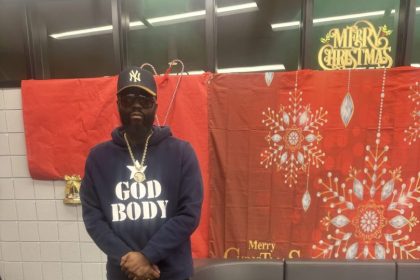
Recently, attorney Benjamin Crump donned a “Black Lawyers Matter” T-shirt while speaking at the Democratic National Convention, which will determine the policy agenda for the upcoming election. This was but the latest show of support for a movement that aligns itself with the Black Lives Matter movement.
Black Lawyers Matter is more than a slogan. I know because I created it after writing a lengthy report published by my organization, Lawyers of Color, which owns On Being a Black Lawyer. Read the article, republished below, to learn how Black lawyers not only impact outcomes for people of color in the criminal justice system, but also how Black civil plaintiffs have better outcomes with Black lawyers.
In response to the killing of Michael Brown in Ferguson, La June Montgomery Tabron, who heads WK Kellogg Foundation, one of the U.S.’ largest philanthropies, issued a statement in which she astutely noted that deaths like Brown’s “demonstrate that the law enforcement and justice systems in our nation are broken.”
Yet as the tally of killings continues to climb, protests have mainly focused on police with an often-cited criticism: the force is too White.
Well, the legal profession is even Whiter, and the job much more subjective.
Consider the role of prosecutors, who, without objective criteria, decide what the charges will be. They alone decide whether to offer a plea bargain or proceed to trial.
They are usually allowed to exercise this power with impunity and outside of public view, but in the last year, the curtain has been pulled back.
In a rash of high-profile police killings of unarmed black males — John Crawford III, Michael Brown, Eric Garner, Tamir Rice, Walter Scott, and most recently, Alton Sterling and Philando Castile — White prosecutors appeared reluctant to vigorously pursue indictments, even when facts were highly disputed. Reports by Talking Points Memo, the Wall Street Journal and the Washington Post conclude that almost none of the police officers who kill roughly 1,000 people each year are ever charged.
By contrast, a strong block of Black prosecutors, including the U.S. attorney general, Loretta Lynch, and her predecessor Eric Holder, are able to respect and support law enforcement without ignoring the complexities of police power.
White prosecutorial restraint does not extend to black defendants

The prosecutorial restraint white prosecutors have recently displayed toward police doesn’t extend to black defendants.
A 2011 study of the New York County district attorney’s office (DANY) found black defendants 19 percent more likely than white defendants to be offered plea deals that included jail or prison time. Black people charged with misdemeanor offenses or drug offenses were also more likely than white people to be held in jail or prison at their arraignment.
Such biases are largely responsible for the current makeup of the prison population. In 2012, African Americans and Hispanics accounted for 58 percent of those in prison for drug offenses.

DANY’s prosecutors are 75 percent white and 10 percent black, with only 6 percent of black attorneys in supervisory positions. Crucially, its staff is actually more diverse than many DA offices across the country, and this lack of diversity has had discriminatory consequences.
A 2010 national study uncovered “shocking evidence of racial discrimination in jury selection in every [southern] state”. The study found evidence that some state and local prosecutors were actually trained to exclude people on the basis of race and instructed on how to conceal their racial bias. While unconscious-bias training and stricter rules might improve the situation, the best way to stem discrimination is to have more black faces in the room. This was the sentiment shared by black prosecutors in a 2010 district attorney roundtable discussion.
As former National Black Prosecutors Association president Bruce Brown put it: “When you have African Americans in the room making decisions, challenging decisions, folks are forced to look at the motives behind what they’re doing, and it’s not until all those motives are questioned that we make sure that our system is working, not only effectively, but also efficiently and fairly for everyone involved.”
There are no black attorneys in Ferguson
How we get those black attorneys in the room is a difficult question that demands an answer.
Just ask the residents of Ferguson, Missouri. The public was shocked to learn that despite its black majority, only 6% of the police force is black. At the time of Brown’s killing in August, the number of black attorneys in Ferguson was zero, according to the Missouri bar, which listed only four white attorneys for the city’s 14,000 black residents, who were issued 92 percent of the city’s warrants and received 95 percent of two-day or more jail sentences.

How we get those black attorneys in the room is a difficult question that demands an answer. Just ask the residents of Ferguson, Missouri. The public was shocked to learn that despite its black majority, only 6 percent of the police force is black. At the time of Brown’s killing, the number of black attorneys in Ferguson was zero, according to the Missouri bar, which listed only four white attorneys for the city’s 14,000 black residents, who were issued 92 percent of the city’s warrants and received 95 percent of two-day or more jail sentences. This according to theJustice Department’s scathing report on the Ferguson police department. And though neighboring St. Louis has a significant number of black attorneys, poverty, scarce public transportation, and lack of knowledge make that gulf much wider than the eight miles separating the two cities.
The Justice Department’s lengthy March report on Ferguson linked a lack of legal representation with police misconduct. In blistering detail, the report demonstrated how the police and courts, whose employees have a proclivity for racist jokes and discriminatory behavior, employ tactics that include harassment involving traffic stops, court appearances, high fines, and the threat of jail to extort money from black residents. By disproportionately targeting African Americans and routinely violating their constitutional rights, Ferguson created the predatory environment in which a jaywalking stop by police officer Darren Wilson could escalate to the homicide of Michael Brown.

Were legal representation available to the black citizens of Ferguson, perhaps they could avoid many of the fines and financial landmines that result from the Ferguson Municipal Court system. Instead, Ferguson residents are subjected to a modern-day debtors’ prison, according to a recent lawsuit filed by ArchCity Defenders, which found that Ferguson’s poor residents provide the second-largest source of revenue for the city, $2,635,400 in 2013 as Ferguson Municipal Court disposed of 24,532 warrants and 12,018 cases, “or about 3 warrants and 1.5 cases per household.”
But why do we need black lawyers?

According to the American Bar Association, 88% of all lawyers are white and only 4.8% are black, so for each of the 60,864 black lawyers there are 686 black citizens needing assistance compared with only 282 white citizens for each of the 1,117,118 white lawyers.

In actuality, the disparity is of course much greater because African Americans are disproportionately entangled in the criminal justice system — one in 15 black men is incarcerated compared to one in 106 white men.

Figures like these make clear why there is a need for black people to have representation in both criminal and civil matters but not why it’s important that a greater percentage of these attorneys be black. Experts maintain that because of a shared group identity a black attorney can more easily communicate with and gain the trust of a black client, but black client outcomes demonstrate a more compelling reason for why more black attorneys are needed.
While there are white lawyers, like the founders of ArchCity Defenders, who are committed to social justice reform and are conscientious, they comprise a very small fraction of practicing attorneys. Moreover, racial bias is a problem too great to be addressed by even the most ardent groups of well-meaning equal justice advocates. In “White Lawyering: Rethinking Race, Lawyer Identity, and Rule of Law,” Russell G. Pearce writes:
“The latest research in the field of organizational behavior suggests that the assumption of lawyer neutrality so central to lawyer professionalism is not only wrong descriptively, but that it also undermines …white lawyers’ ability to provide their [black] clients with optimal representation.”
To put it bluntly, studies show that white attorneys might have biases that result in less favorable outcomes for their black clients. Criminal cases aren’t the only ones in which black people are disadvantaged. Several studies reveal that African Americans suffer worse legal outcomes than their white counterparts in civil cases, even when controlling for income and educational levels. While the researchers have no way of knowing whether the disparate treatment is intentional, the proof of white attorney bias exists across many legal practice areas.
A study funded by the American Bar Foundation examined employment discrimination cases and tried to determine why African Americans are 2.5 times more likely than white plaintiffs to file employment discrimination claims pro se, in which plaintiffs represent themselves and typically have significantly worse litigation outcomes than those with representation. The researchers found that while part of the problem stems from African Americans’ lack of trust, information, and resources regarding lawyers and the legal system, the blame also rests on the shoulders of the mostly white discrimination lawyers, who one would hope would be particularly conscientious. Of the 20 lawyers who participated, 19 were white and admitted that in deciding to reject a case, they considered clients’ ability to pay, as well as their perceived “demeanor and mannerisms,” which is often coded language for racial characteristics.

In the study, “Race, Attorney Influence, and Bankruptcy Chapter Choice,” researchers found that even after controlling for financial, demographic, and other factors, lawyers, in part because of biases, were disproportionately steering blacks into Chapter 13 (the more onerous and costly form of consumer bankruptcy). Attorneys recommend Chapter 13 to black clients twice as often as they do white clients, even when clients prefer the less onerous Chapter 7.

The researchers also found that bankruptcy attorneys were more likely to recommend Chapter 13 to the hypothetical debtors named “Reggie & Latisha” than to “Todd & Allison.” And while “Todd & Allison” were perceived as having better values and being more competent when they wanted to file Chapter 7, giving them a “fresh start,” “Reggie & Latisha” were credited with such values only when they expressed a preference for chapter 13. As a consequence of such biases, African Americans have the highest rates of Chapter 13 filings.
…And black judges

Even the bench does not appear exempt from such biases. In “Myth of the Color-Blind Judge,” Pat K. Chew, a professor at the University of Pittsburgh School of Law, and Robert E. Kelley, a professor at Carnegie Mellon University Tepper School of Business, performed an empirical study of federal government harassment cases spanning 20 years and concluded:
“Our work initially confirms certain characteristics of racial harassment cases: the vast majority of the judges are White; the vast majority of the plaintiff-employees are African American; the vast majority of accused harassers are White; and that, when studying case outcomes, plaintiff- employees have a very poor win rate in general—succeeding in only 22 percent of cases overall. Furthermore, the statistical analyses consistently showed that the race of the judge can make a significant difference. While plaintiffs have a poor win rate in general, they are much more likely to win if their cases come before African American rather than White judges.”
The lack of judicial diversity extends beyond federal courts to state benches where the majority of legal disputes are adjudicated. A report by the Brennan Center found that the judicial selection commissions of some states have no African American representation, and as recently as 2010 there were still some states with all-white benches. They also noted evidence that the number of black male judges is actually decreasing. According to the American Bar Association, in state trial courts, where the vast majority of cases are handled, only 7 percent of judges are black.
… And black law clerks

Judicial homogeneity naturally leads to a lack of diversity among law clerks, who can have enormous influence with their judges. In 1998, USA Today caused an uproar among social justice advocates and members of the Congressional Black Caucus when its investigation revealed that of the 394 law clerks hired by the nine sitting Supreme Court Justices, only seven had been African American. Then sitting justices William Rehnquist, Anthony Kennedy, Antonin Scalia, and David Souter had never hired a black clerk.
A decade later, a study by the Administrative Office of the U.S. Courts found that the number of African Americans clerking for appellate judges had actually declined from 3.5 percent in 2006 to 2.4 percent in 2010. At the district court level, the percentage of African American clerks declined from 3.5 percent to 3.2 percent.
The empirical evidence leaves little doubt that African Americans are currently disadvantaged by the justice system, so the only remaining question is, “What can be done about it?” Of course, we must provide more training and research on unconscious bias among legal professionals, but without more black attorneys the justice system can’t fulfill its mission. The law, by its very nature, is subjective and requires diverse viewpoints to be fully realized. If the only perspective considered is that of the majority, minority interests will certainly be trampled upon. The road to justice eventually comes through the judicial system. An overwhelmingly white bar stood at the helm when racial disparities in our legal system came into existence, so one cannot expect significant change as long as the demographic remains as it is.
How do we get more black lawyers?
Foundations, corporations, advocates, and politicians should use their considerable power to bear down on the legal profession, which continues to fail at its critical mission to increase the number of black lawyers. For three decades, the legal profession has insisted that racial diversity was a priority, yet the profession remains stubbornly white. The last decade has seen the percentage of black attorneys stagnate, increasing by only .4 percent. The percentage of African Americans at top law schools and large law firms has actually declined.
Black law students are shackled with considerably more student loan debt than their white counterparts. This debt impacts everything from bar passage rates to career choices. Those with the most promise can’t consider social justice jobs because they can’t afford the cut in pay. In many instances, black graduates from lower ranked law schools are are shut out of the legal profession altogether.
It is curious that a profession that exists to further thought and solve complex social, ethical and legal problems has been unable to solve its own even when some solutions seem obvious — increase minority law school pipeline initiatives and remove the cost impediments of attending law school; provide more training and apprenticeship opportunities; and above all else, treat black attorneys fairly once they enter the profession.
In considering the bar’s protracted approach to diversifying the profession, I’m reminded of Dr. Martin Luther King Jr.’s Letter From A Birmingham Jail:
“Wait!” It rings in the ear of every Negro with piercing familiarity. This “Wait” has almost come to see, with one of our distinguished jurists, that “justice too long delayed is justice denied.”

